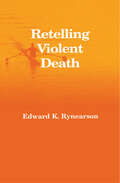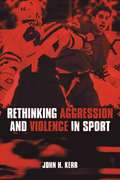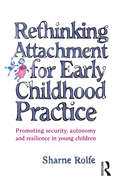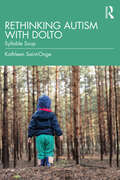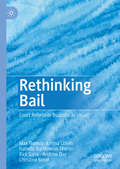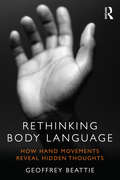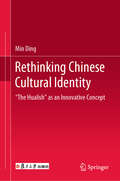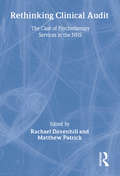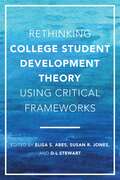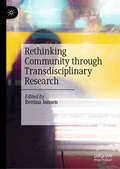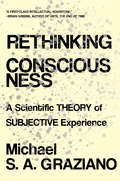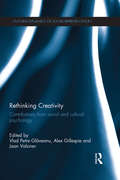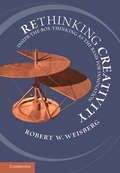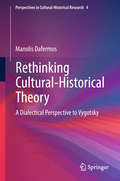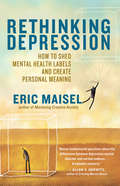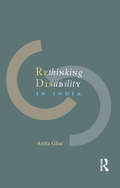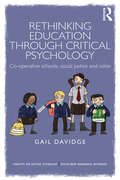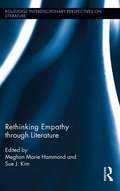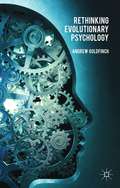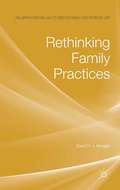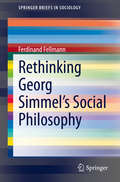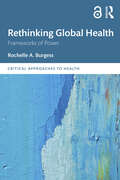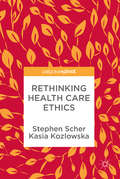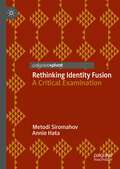- Table View
- List View
Retelling Violent Death
by Edward RynearsonThis book provides insight and instruction for bereaved readers and those who work with them.
Rethinking Aggression and Violence in Sport
by John H. KerrRethinking Aggression and Violence in Sport explores the psychological aspects of these two intrinsic elements of competitive sport. This book critically examines the important issues associated with aggression and violence in sport, including: * a review of current theory in the psychology of aggression * exploration of how players become acclimatised to physical violence* discussion of the psychological benefits of sanctioned and unsanctioned sport violence* examination of the moral and ethical dimensions of the debate* the psychological basis of spectator aggression* case studies from a wide variety of sports. This text is a must read for researchers and students within sport studies, psychology and sociology with an interest in human violence and aggressive behaviour.
Rethinking Attachment for Early Childhood Practice: Promoting security, autonomy and resilience in young children
by Sharne A RolfeSharne Rolfe brings an excellent discussion of attachment principles, research and applications to an exceedingly important topic, the relationships between child care teachers/providers and young children. It is a important resource for the current and next generation of early childhood professionals and researchers, and it will be a key resource for the growing international discussion about child care teacher/provider and child relationships.' Helen H. Raikes, PhD, The Gallup Organization, and Society for Research in Child Development Consultant, Administration for Children and Families, USA a timely synthesis of current knowledge concerning attachment and its implications for contemporary practice.highly relevant for use in college and university early childhood programs and a valuable resource for directors and staff in children's services'Alan Hayes, Professor of Early Childhood Studies, Macquarie University particularly valuable in highlighting the crucial importance of taking a relationship-based approach when working with young children.'Pam Linke, Manager, Centre for Parenting, Child and Youth Health, South Australia This accessible and lively exploration of the importance of attachment for infants, young children and their parents, should be essential reading for all professional caregivers and for policy makers concerned with the mental health and well being of our future generation.' Ruth Schmidt Neven, Director, Centre for Child and Family DevelopmentIn heated debates about whether childcare damages young children, attachment theory has been seen as anti-childcare'. Rolfe rethinks this perception, demonstrating instead that understanding attachment is essential to good childcare practice. Rethinking Attachment offers a thorough explanation of attachment theory and explains how security, autonomy and resilience in young children can be promoted in childcare settings through a sound understanding of attachment principles.With examples drawn from practice, Rolfe examines the relationships between children and their carers, between parents and carers, and between carers themselves. She also shows how secure attachment relationships with parents and carers influence transitions to childcare, preschool and school.
Rethinking Autism with Dolto: Syllable Soup
by Kathleen Saint-OngeRethinking Autism with Dolto takes up a principal legacy of Françoise Dolto’s immense project—her conviction that autism is a regression to the archaic.Dolto theorizes that the infant in utero, deep in dreams, is receptive to the audition of “phonemes” during the pre-conscious “archaic stage” of psychosexual maturation. That dream-work on words—an idiosyncratic prehistory at the onset of mental and emotional life—secures the unconscious circulation of affect and the ontogeny of thought long prior to speech, seeding associative thinking and facilitating self-regulation. Kathleen Saint-Onge uses the written work of four nonverbal autistic authors in seeking corroboration for Dolto’s formulations, finding thoughtful self-reflections that relate the experience of living in silence with relentless anxiety while relying on regression as a defence. Dolto’s unprecedented insights into the infant’s earliest learning carry formidable implications for autism interventions, and for primary language and literacy. At issue is an enduring susceptibility to archaic echoes—the haphazard, securing return of pre-invested phonemes—in communicative exchanges, including reading and writing.Rethinking Autism with Dolto considers unconscious processes as inherently reparative, heralding the responsibility education holds for human health, and supports a rethinking of autism that presumes competence. Readers are invited to new conversations in psychoanalysis, child development, education and linguistics through an exploration of the unconscious concomitants of first language acquisition.
Rethinking Bail: Court Reform or Business as Usual?
by Max Travers Emma Colvin Isabelle Bartkowiak-Théron Rick Sarre Andrew Day Christine BondThis book arises from a research project funded in Australia by the Criminology Research Council. The topic, bail reform, has attracted attention from criminologists and law reformers over many years. In the USA, a reform movement has argued that risk analysis and pre-trial services should replace the bail bond system (the state of California may introduce this system in 2020). In the United Kingdom, Europe and Australia, there have been concerns about tough bail laws that have contributed to a rise in imprisonment rates. The approach in this book is distinctive. The inter-disciplinary authors include criminologists, an academic lawyer and a forensic psychologist together with qualitative researchers with backgrounds in sociology and anthropology. The book advances a policy argument through presenting descriptive statistics, interviews with practitioners and detailed accounts of bail applications and their outcomes. There is discussion of methodological issues throughout the book, including the challenges of obtaining data from the courts.
Rethinking Body Language: How Hand Movements Reveal Hidden Thoughts
by Geoffrey BeattieChallenging all of our old assumptions about the subject, Rethinking Body Language builds on the most recent cutting-edge research to offer a new theoretical perspective on this subject that will transform the way we look at other people. In contrast to the traditional view that body language is primarily concerned with the expression of emotions and the negotiation of social relationships, author Geoff Beattie argues instead that gestures reflect aspects of our thinking but in a different way to verbal language. Critically, the spontaneous hand movements that people make when they talk often communicate a good deal more than they intend. This ground-breaking book takes body language analysis to a whole new level. Engagingly written by one of the leading experts in the field, it shows how we can detect deception in gesture–speech mismatches and how these unconscious movements can give us real insight into people's underlying implicit attitudes.
Rethinking Chinese Cultural Identity: "The Hualish" as an Innovative Concept
by Min DingGrounded in history and guided by theory, this book proposes a new inclusive cultural label, Hualish, to remedy the limitations of the word “Chinese” and replace it as the culture label for the people of “greater China“ origin. The book first introduces the Culture Design Paradigm, a general culture design paradigm with three core components: vitality, structure, and foci. It then uses the Culture Design Paradigm to construct the new conceptual identity, Hualish. This is followed by detailed discussion of three practical paths that can lead to a desirable Hualish identity - the recipe path, the example path, and the normative path. Lastly, the book proposes Humanistic Hualish as a converging and gravitative Hualish culture.Built upon a rigorous academic foundation, the book provides practical guidance to individuals, families, associates, as well as organizations.
Rethinking Clinical Audit: Psychotherapy Services in the NHS
by Rachael Davenhill; Matthew PatrickClinical audit can be a powerful tool for change, but is often perceived as externally-imposed time-wasting. Focusing on applications of clinical audit in psychoanalytic psychotherapy NHS services, the authors examine why audit is resented, how it can be 'reconstructed' as a useful tool for clinicals, and provide real-life examples of good practice. More than a simple 'how-to', this book provides new rnderstanding of a persistent problem in health-care organisations and will be of interest to all mental health staff, trainees and service managers.
Rethinking College Student Development Theory Using Critical Frameworks
by Elisa S. Abes Susan R. Jones D. L. StewartA major new contribution to college student development theory, this book brings “third wave” theories to bear on this vitally important topic for anyone working on campus today. The book has three sections: The first briefly introduces the third wave theories that have recently expanded the frame of the topic; the second uses those theories to focus on specific aspects of student development; and the third brings it all together with a few chapters that look at the implications for practice. The first section includes a chapter that provides an overview of the evolution of student development theories as well as chapters describing the critical and post structural theories most relevant to the next iteration of student development theory. These theories include critical race theory, queer theory, feminist theories, intersectionality, decolonizing/indigenous theories, and crip theories. These chapters also include a discussion of how each theory is relevant to the central questions of student development theory. The second section provides critical interpretations of the primary constructs associated with student development theory. These constructs and their related ideas include resilience, dissonance, socially constructed identities, authenticity, agency, context, development (consistency/coherence/stability), and knowledge (sources of truth and belief systems). Each chapter begins with brief personal narratives on a particular construct; the chapter authors then re-envision the narrative’s highlighted construct using one or more critical theories. The third section will focus on implications for practice. Specifically, these chapters will consider possibilities for how student development constructs re-envisioned through critical perspectives can be utilized in practice. The primary audience for the book is faculty members who teach in graduate programs in higher education and student affairs and their students. It may also be of interest to faculty and graduate students in psychology, sociology, and ethnic studies, as well as women’s, gender, and sexuality studies departments. The book will also be useful to practitioners seeking guidance in working effectively with students across the convergence of multiple aspects of identity and development.
Rethinking Community through Transdisciplinary Research
by Bettina JansenThis book offers the first interdisciplinary survey of community research in the humanities and social sciences to consider such diverse disciplines as philosophy, religious studies, anthropology, sociology, disabilities studies, linguistics, communication studies, and film studies. Bringing together leading international experts, the collection of essays critically maps and explores the state of the art in community research, while also developing future perspectives for a cross-disciplinary rethinking of community. Pursuing such a critical, transdisciplinary approach to community, the book argues, can counteract reductive appropriations of the term ‘community’ and, instead, pave the way for a novel assessment of the concept’s complexity. Since community is, above all, a lived practice that shapes people’s everyday lives, the essays also suggest ways of redoing community; they discuss concrete examples of community practice, thereby bridging the gap between scholars and activists working in the field.
Rethinking Consciousness: A Scientific Theory Of Subjective Experience
by Michael S GrazianoNeuroscientist and psychologist Michael S. A. Graziano puts forward a groundbreaking new theory on the origin of consciousness. Focusing attention can help an animal find food or flee a predator. It also may have led to consciousness. Tracing evolution over millions of years, Michael S. A. Graziano uses examples from the natural world to show how neurons first allowed animals to develop simple forms of attention: taking in messages from the environment, prioritizing them, and responding as necessary. Then some animals evolved covert attention—a roving mental focus that can take in information apart from where the senses are pointed, like hearing sirens at a distance or recalling a memory. Graziano proposes that in order to monitor and control this specialized attention, the brain evolved a simplified model of it—a cartoonish self-description depicting an internal essence with a capacity for knowledge and experience. In other words, consciousness. In this eye-opening work drawn from his and other scientists’ experiments, Graziano accessibly explores how this sense of an inner being led to empathy and formed us into social beings. The theory may point the way to engineers for building consciousness artificially, and even someday taking the natural consciousness of a person and uploading it into a machine for a digital afterlife. Graziano discusses what a future with artificial conscious might be like, including both advantages and risks, and what AI might mean for our evolutionary future.
Rethinking Creativity: Contributions from social and cultural psychology (Cultural Dynamics of Social Representation)
by Vlad Petre Glăveanu Alex Gillespie Jaan ValsinerDespite more than half a century of psychological research on creativity we are still far from a clear understanding of the creative process, its antecedents and consequences and, most of all, the ways in which we can effectively support creativity. This is primarily due to a narrow focus on creative individuals isolated from culture and society. Rethinking Creativity proposes a fundamental review of this position and argues that creativity is not only a psychological but a sociocultural phenomenon. This edited volume aims to relocate creativity from inside individual minds to the material, symbolic and social world of culture. It brings together eminent social and cultural psychologists who study dynamic, transformative and emergent phenomena, and invites them to conceptualise creativity in ways that depart from mainstream definitions and theoretical models existing in past and present literature on the topic. Chapters include reflections on the relationship between creativity and difference, creativity as a process of symbolic transformation, the role of apprenticeships and collaboration, the importance of considering materiality and affordances in creative work, and the power of imagination to construct individual trajectories. The diverse contributions included in this book offer readers multiple pathways into the intricate relationship between mind, culture, and creativity, and invite them to rethink these phenomena in ways that foster creative action within their own life and the lives of those around them. It will be of key interest to both social and cultural psychologists, as well as to creativity researchers and those who, as part of their personal or professional life, try to understand creativity and develop creative forms of expression.
Rethinking Creativity: Inside-the-Box Thinking as the Basis for Innovation
by Robert W. WeisbergThis book presents a new perspective on creativity: that creative innovation depends on inside-of-the-box thinking. Not outside the box, as we all believed. It shows that creativity builds on what we know and how we use old ideas to produce new ones. In a highly readable format, Robert W. Weisberg uses case studies of seminal creative advances, such as Leonardo's 'Aerial Screw' and Frank Lloyd Wright's 'Falling water' house. These fascinating examples are evaluated alongside cutting-edge research to present an analysis of creativity that challenges us to think differently about this intriguing cognitive ability.
Rethinking Cultural-Historical Theory: A Dialectical Perspective To Vygotsky (Perspectives In Cultural-historical Research Ser. #4)
by Manolis DafermosThis book is an exploration of science in the making. It offers readers the opportunity to critically reflect on the process of development of Vygotsky's research program from the perspective of dialectics, focusing on the dramatic process of building and rebuilding cultural historical theory. Vygotsky's creative and dramatic journey is no less important than the concrete results of his research. An epistemological and historical investigation of the formulation of cultural historical theory sheds light on the process of knowledge production and reveals hidden dimensions of creativity in science.
Rethinking Depression
by Eric MaiselIn this provocative and pathbreaking distillation of a career spent working with individuals seeking help with mood and motivation, Eric Maisel reveals the implications of one of the most dramatic cultural shifts of our time. In recent decades, much of the unhappiness inherent in the human condition has been monetized and labeled as the disease of depression and related "disorders." Maisel persuasively critiques this sickness model and prescribes a potent new therapy. The existential cognitive-behavioral therapy (ECBT) he details here marries the proven methods of CBT with the powerful meaning-based orientation of existential therapy. The result is a revolutionary reimagining of life's difficulties and a liberating model of self-care that optimizes the innate human ability to create meaning and seize opportunity -- in any circumstance.
Rethinking Disability in India
by Anita GhaiMoving away from clinical, medical or therapeutic perspectives on disability, this book explores disability in India as a social, cultural and political phenomenon, arguing that this `difference' should be accepted as a part of social diversity. It further interrogates the multiple issues of identification of the disabled and the forms of oppressio
Rethinking Education through Critical Psychology: Cooperative schools, social justice and voice (Concepts for Critical Psychology)
by Gail DavidgeSince the very first ‘co-operative’ school opened its doors in 2008, the complicated relations between ‘co-operative’ approaches to schooling and democratic subjectivity remain unexplored. This ground breaking book considers the role of ‘voice’ in co-operative schooling and its place in radical research, offering an original, critical analysis of an alternative model of ‘co-operative’ schooling set within the context of the contemporary public education sector in England. Drawing on post structural theory and critical ethnographic research, the author explores how this model might offer new ways of thinking about what education is for and who stands to benefit or lose when schools adopt co-operative ways of working together across the structures of governance, pedagogy and curriculum. The book considers how participatory ways of working in education might inform a more critical educational psychology that takes engendering equality and collective well-being as an alternative starting point to measuring individual achievement and cognitive development. This text will appeal to advanced level undergraduate and postgraduate students, researchers and practitioners, particularly in the field of psychology, education, politics and social research, with an interest in developing a critical appreciation of inequalities in education and in reimagining the possibilities for change.
Rethinking Empathy through Literature (Routledge Interdisciplinary Perspectives on Literature)
by Sue J. Kim Meghan Marie HammondIn recent years, a growing field of empathy studies has started to emerge from several academic disciplines, including neuroscience, social psychology, and philosophy. Because literature plays a central role in discussions of empathy across disciplines, reconsidering how literature relates to "feeling with" others is key to rethinking empathy conceptually. This collection challenges common understandings of empathy, asking readers to question what it is, how it works, and who is capable of performing it. The authors reveal the exciting research on empathy that is currently emerging from literary studies while also making productive connections to other areas of study such as psychology and neurobiology. While literature has been central to discussions of empathy in divergent disciplines, the ways in which literature is often thought to relate to empathy can be simplistic and/or problematic. The basic yet popular postulation that reading literature necessarily produces empathy and pro-social moral behavior greatly underestimates the complexity of reading, literature, empathy, morality, and society. Even if empathy were a simple neurological process, we would still have to differentiate the many possible kinds of empathy in relation to different forms of art. All the complexities of literary and cultural studies have still to be brought to bear to truly understand the dynamics of literature and empathy.
Rethinking Evolutionary Psychology
by A. GoldfinchRethinking Evolutionary Psychology identifies, champions and vindicates a streamlined evolutionary psychology. It offers a new way of thinking that moves decisively away from theoretical and critical excess. Where standard accounts often obscure and distort, this book emphasizes and develops evolutionary psychology's heuristic credentials.
Rethinking Evolutionary Psychology
by Andrew GoldfinchIn Rethinking Evolutionary Psychology, Andrew Goldfinch dramatically reframes the way we think about evolutionary psychology. Rather than follow the standard way of thinking about evolutionary psychology as a paradigm and a pretender metatheory of the evolutionary behavioural sciences, Goldfinch argues that evolutionary psychology is better thought of as a heuristic research programme within the evolutionary behavioural sciences. Elucidating evolutionary psychology as a heuristic illuminates those aspects of adaptationist methodology in psychology that deserve serious attention. It reveals evolutionary psychology to be a unique set of concepts, research strategies and recipes for generating new and bold discoveries in psychology; a searchlight that can identify and chart plausible and unexplored research trajectories; a constrained yet creative way to win new facts that would otherwise be lost to the infinite space of random trial and error.
Rethinking Family Practices (Palgrave Macmillan Studies in Family and Intimate Life)
by D. MorganLeading family sociologist David Morgan revisits his highly influential 'family practices' approach in this new book. Exploring its impact, and how it has been critiqued, Morgan shows the continued relevance of the approach with reference to time and space, the body, emotions, ethics and work/life balance.
Rethinking Georg Simmel's Social Philosophy (SpringerBriefs in Sociology)
by Ferdinand FellmannThis textbook examines interaction, reciprocity, dualism, conflict, and personality in the work of Georg Simmel. These themes, which made Simmel the founder of relational sociology, are presented uniquely in the light of intimate relations. According to Simmel, intimate relations rather than the individual constitute the fundamental stratum of human culture. By relating objective social facts to subjective experience, Simmel also opened up a new way of understanding human life in the early 20th century. Using Simmel’s theory of reciprocity, this book follows an innovative method of interpretation, providing a quantitative perspective of lived experience. This book analyzes Simmel’s ideas from the viewpoint of modern hermeneutical philosophy and sociology. Fellmann expertly presents the historical context of Simmel’s concepts, and their influence on other sociologists and philosophers, especially in Germany. Written in an engaging style, this book is suitable as a core text in undergraduate and graduate courses on sociological theory and continental philosophy. Additionally, given the new focus on Simmel and intimate relations, the book is of interest to scholars of relational sociology, history of sociology, continental philosophy, history of philosophy, philosophy of culture, and philosophical anthropology.
Rethinking Global Health: Frameworks of Power (Critical Approaches to Health)
by Rochelle A. BurgessThis book reflects and analyses the working of power in the field of global health– and what this goes on to produce. In so doing, Rethinking Global Health asks the pivotal questions of, ‘who is global health for’ and ‘what is it that limits our ability to build responses that meet people where they are?’ Covering a wide range of topics from global mental health to Ebola, this book combines power analyses with interviews and personal reflections spanning the author’s decade-long career in global health. It interrogates how the search for global solutions can often end up far from where we anticipated. It also introduces readers to different frameworks for power analyses in the field, including an adaptation of the ‘matrix of domination’ for global health practice. Through this work, Dr Burgess develops a new model of Transformative Global Health, a framework that calls researchers and practitioners to adopt new orienting principles, placing community interests and voices at the heart of global health planning and solutions at all times. This book will be beneficial to students and academics working in the global and public health landscape. It will also hold appeal to activists, practitioners and individuals invested in the discipline and in health equity around the world.
Rethinking Health Care Ethics
by Stephen Scher Kasia KozlowskaThe goal of this open access book is to develop an approach to clinical health care ethics that is more accessible to, and usable by, health professionals than the now-dominant approaches that focus, for example, on the application of ethical principles. The book elaborates the view that health professionals have the emotional and intellectual resources to discuss and address ethical issues in clinical health care without needing to rely on the expertise of bioethicists. The early chapters review the history of bioethics and explain how academics from outside health care came to dominate the field of health care ethics, both in professional schools and in clinical health care. The middle chapters elaborate a series of concepts, drawn from philosophy and the social sciences, that set the stage for developing a framework that builds upon the individual moral experience of health professionals, that explains the discontinuities between the demands of bioethics and the experience and perceptions of health professionals, and that enables the articulation of a full theory of clinical ethics with clinicians themselves as the foundation. Against that background, the first of three chapters on professional education presents a general framework for teaching clinical ethics; the second discusses how to integrate ethics into formal health care curricula; and the third addresses the opportunities for teaching available in clinical settings. The final chapter, "Empowering Clinicians", brings together the various dimensions of the argument and anticipates potential questions about the framework developed in earlier chapters.
Rethinking Identity Fusion: A Critical Examination
by Metodi Siromahov Annie HataRethinking Identity Fusion presents a critique of Identity Fusion Theory, an identity-based social psychological approach to understanding pro-group extremism. It scrutinises the theory’s main theoretical claims and research methods, exposing serious inconsistencies and gaps in how the theory handles the concept of identity and in its research programme. The book demonstrates the flattening of the theory’s main concept, “identity fusion”, and the general state of confusion in the recent literature as to the theory’s claims and predictions.The book offers a reinterpretation of Identity Fusion Theory through a discursive perspective, critiquing its cognitivist assumptions about the nature of human relationships and identity. In this way, its scope extends to wider critiques of experimental and quantitative methods in contemporary social psychology. It argues that such theoretical and methodological shortcomings, rather than hindering a flawed approach, can accelerate its adoption in social psychology by creating an image of theoretical unity and consistency on top of a field characterised by confusion and contradiction.
